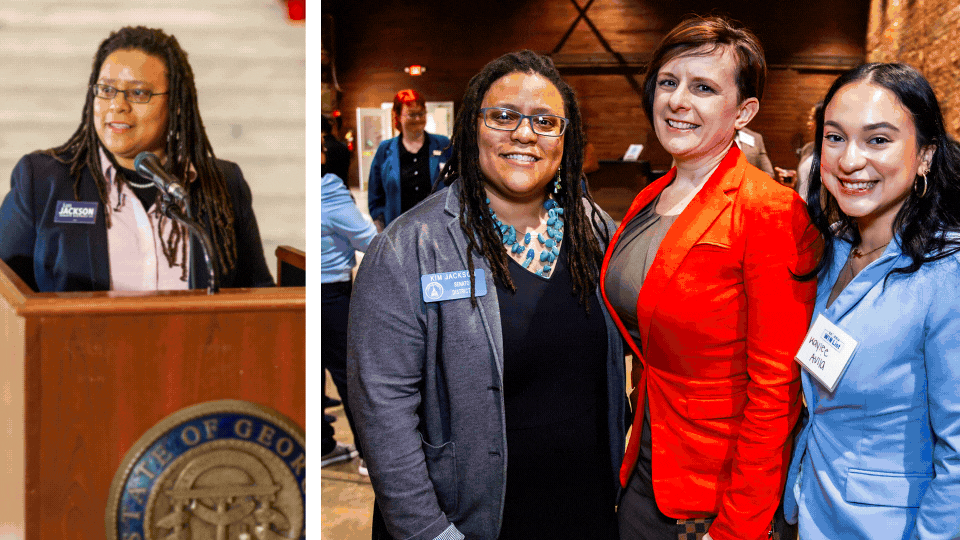The Rev. Senator Kim Jackson recently added Senate Minority Whip to her already bursting portfolio as Episcopal priest and advocate for Atlanta’s unhoused community, DeKalb County senator, an urban farmer and a wife and mother of two young boys.
Georgia WIN List asked The Rev. Senator Jackson about her new leadership role and the Senate caucus priorities for the upcoming session. The full interview is below:
What are the highest priorities for Senate Democrats during the 2025 Legislative session?
We remain steadfast in our commitment to expanding medical and health care access for all Georgians. The Senate Democratic caucus is deeply committed to public education and fully funding public schools by modernizing the funding formula to better meet the needs of all Georgia students. We are also deeply invested in securing more affordable housing options for Georgians and continuing to push for rent stabilization.
Which policies already being promoted by Republicans do Democrats find most egregious?
We continue to be horrified by Republican attacks on innocent children in our school systems with proposed legislation which continues to harass a small subset of children who identify as trans. We can do so much better.
The continued resistance by Governor Brian Kemp to expand Medicaid and expand healthcare options for almost half a million Georgians is an immoral position which deeply troubles us.
Are there pressing issues where you believe bi-partisan solutions can be found?
I do think we can find bi-partisan agreement within the General Assembly for increasing Medicaid coverage for more Georgians. Further, I will be sponsoring a bill with strong bi-partisan support which creates a pathway that allows persons trained internationally as physicians to get a license to practice here in Georgia. This new program would help address the physician shortage we now experience in many parts of the state.
A House study committee during the interim between sessions has carefully reviewed the currently used funding formula for public education. The legislative proposals expected as a result of this work should receive bi-partisan support.
During you professional career you have most recently served as Vicar for The Church of the Common Ground. Could you explain this role and how it overlaps with your Senate service?
My role at Church of the Common Ground is to create a church of community for people who are experiencing homelessness. Many of my parishioners receive services directly across the street from Capitol. My role is to not only provide one-on-one pastoral care for those living on the streets near the Capitol, but also to go inside the Capitol and work to address the systemic issues which result in homelessness in the first place. I have long been a champion for increasing access to mental health services and increasing access for supportive housing options for Georgia’s most vulnerable citizens.
Has your dual role raised more awareness for issues facing the unhoused community?
My colleagues deeply respect the work I do and understand that I bring first-hand knowledge of these issues. This has allowed me to lead bipartisan efforts for expanding access to mental health services.
Please explain the details of your bill which will expand opportunities for internationally trained physicians to practice in Georgia?
I represent Clarkston which is home to people from 80 countries across the world. There are well-trained and highly-qualified physicians living in my district who are currently driving for Door Dash rather than being able to deliver the medical care they trained for years to provide in their country of origin.
Currently, physicians with international training – even those with years and years of medical practice in another country — must apply for and participate in a residency program. This process can take years and presents an extraordinarily difficult and almost impossible hurdle. Further, when these internationally trained physicians apply for and are accepted for a residency program, they “take away” a coveted slot from students who are currently enrolled in medical school.
My bill, which has bi-partisan support, would recognize the international medical training already received and require applicants to pass written board examinations. With successful completion of these board examinations, those accepted to the program would practice for two years under supervision of a fully licensed Georgia physician in a high needs area – either in rural counties or urban areas classified as medical deserts.
There is great need for such a program since 82 of Georgia’s 159 counties do not currently have an OB-GYN and 65 counties do not have a pediatrician. Both Virginia and Tennessee have passed similar legislation. In fact, on the first day Tennessee began accepting applications for their new program, the computer system crashed because more than 200 applications were received.
What is the role of a whip in a legislative body?
The whip is responsible for keeping the caucus focused on legislative priorities and managing floor strategy when members are engaged in debates. The whip generates enthusiasm for caucus legislative positions and carefully monitors the count for expected votes when issues are close – encouraging members who may be wavering to stick with their caucus.
Which political leader past or present serves as a role model for you?
Former Senator Vincent Fort, who recently passed away, was Whip of the Democratic caucus a decade ago when I first began following Georgia politics. Senator Fort was also a Reverend and watching him pull his caucus together and use his great gifts of oratory was always inspirational to me. I hope to follow his example and build a legislative record as a clear moral voice of authority in the Georgia Senate.
With Republicans in control at the state and national level, many who have been active in advocacy work for years are still depressed following November election results. What gives you hope for moving forward?
I am inspired by grassroots organizations who continue to do the important work of caring well for one another. Specifically, I want to highlight the work of those women who came together when abortion care in Georgia became extremely limited. Women rallied around creation of a fund which ensures women are able to travel out of state to receive the care they need. This is a sign of our collective power – a power which cannot be tamed!
In my own neighborhood, I have watched a group of women organize on Facebook to provide food and housing options for people in need. They know the much needed social services safety net does not exist in this area and they have worked together to create a safety net in beautiful and powerful ways.
What is your best advice for those who want to make a difference?
I want to remind everyone to remain hopeful and to find a group of friends, comrades and colleagues who can do this work with you
What is your best advice for those who are considering running for office?
Just do it! Run for office! But, before you run for a legislative seat, really spend some time down at the Capitol and get training. I am a graduate of the WIN Leadership Academy and it was one of the most helpful trainings I received before I became a candidate.

